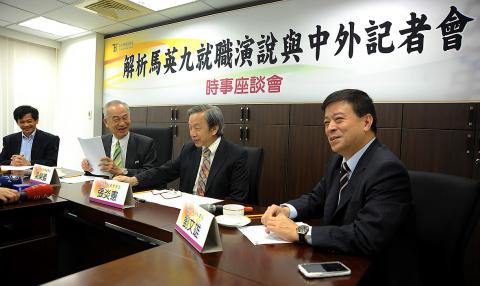President Ma Ying-jeou’s (馬英九) inaugural speech on Sunday was vague, conflicting and cliched, addressing neither what should be done to solve domestic economic woes nor uphold Taiwan’s sovereignty, political analysts told a forum yesterday.
The president did not address what he would do to rejuvenate Taiwan’s economy, nor did he apologize for a series of ill-advised policies, such as fuel and electricity price increases and the controversy over imports of meat containing the feed-additive ractopamine, said Wu Rong-i (吳榮義), president of the Taiwan Brain Trust think tank, which organized the forum.
Wu desribed the speech as having “one no and four withouts” — meaning Ma showed no -understanding of public opinion, while he failed to apologize for poor policies, showed no self-introspection, insisted on using the “one China” framework and put forward no new ideas.

Photo: Liu Hsin-de, Taipei Times
Ma misinterpreted the Republic of China (ROC) Constitution in his speech because the “outdated” Constitution should not be used to explain Taiwan’s sovereignty and the “status quo,” Taiwan Association of University Professors -president Chang Yen-hsien (張炎憲) said.
Moreover, Chang said, as the president of Taiwan, Ma’s highlighting “Zhonghua Culture (中華文化)” and “Zhonghua Minzu (中華民族)” was “completely impractical” and neglected Taiwan’s traditional culture and values.
“The emphasis on Zhonghua Minzu was just what Beijing wanted to hear because it reaffirmed the connection between Taiwan and China. It also implies that Ma favors eventual unification,” he said.
Ma’s reiteration of the “one country, two areas (一國兩區)” formula suggested “de facto unification,” mislead the international community and legitimized Beijing’s anti-secession law, which was ratified in 2005, said David Huang (黃偉峰), a researcher at Academia Sinica.
The “one country, two areas” proposal raised eyebrows earlier this year when former Chinese Nationalist Party (KMT) chairman Wu Poh-hsiung (吳伯雄) delivered it to Chinese President Hu Jintao (胡錦濤) during a visit to Beijing.
“It’s clear that the international community recognizes the China in ‘one China’ as the People’s -Republic of China, not the ROC,” Huang said.
People First Party Deputy Secretary-General Liu Wen-hsiung (劉文雄) said Ma had turned his back on the people with his inconsistent policies, arrogance and authoritarianism.
Some of Ma’s policies seemed to be conflicting, Liu said, such as his plan to establish a free-trade area in Greater Kaohsiung to attract Chinese investment and his pledge to join the Trans-Pacific Partnership, an economic integration that aims to contain China, in eight years.

Alain Robert, known as the "French Spider-Man," praised Alex Honnold as exceptionally well-prepared after the US climber completed a free solo ascent of Taipei 101 yesterday. Robert said Honnold's ascent of the 508m-tall skyscraper in just more than one-and-a-half hours without using safety ropes or equipment was a remarkable achievement. "This is my life," he said in an interview conducted in French, adding that he liked the feeling of being "on the edge of danger." The 63-year-old Frenchman climbed Taipei 101 using ropes in December 2004, taking about four hours to reach the top. On a one-to-10 scale of difficulty, Robert said Taipei 101

Nipah virus infection is to be officially listed as a category 5 notifiable infectious disease in Taiwan in March, while clinical treatment guidelines are being formulated, the Centers for Disease Control (CDC) said yesterday. With Nipah infections being reported in other countries and considering its relatively high fatality rate, the centers on Jan. 16 announced that it would be listed as a notifiable infectious disease to bolster the nation’s systematic early warning system and increase public awareness, the CDC said. Bangladesh reported four fatal cases last year in separate districts, with three linked to raw date palm sap consumption, CDC Epidemic Intelligence

US climber Alex Honnold left Taiwan this morning a day after completing a free-solo ascent of Taipei 101, a feat that drew cheers from onlookers and gained widespread international attention. Honnold yesterday scaled the 101-story skyscraper without a rope or safety harness. The climb — the highest urban free-solo ascent ever attempted — took just more than 90 minutes and was streamed live on Netflix. It was covered by major international news outlets including CNN, the New York Times, the Guardian and the Wall Street Journal. As Honnold prepared to leave Taiwan today, he attracted a crowd when he and his wife, Sanni,

Taiwanese and US defense groups are collaborating to introduce deployable, semi-autonomous manufacturing systems for drones and components in a boost to the nation’s supply chain resilience. Taiwan’s G-Tech Optroelectronics Corp subsidiary GTOC and the US’ Aerkomm Inc on Friday announced an agreement with fellow US-based Firestorm Lab to adopt the latter’s xCell, a technology featuring 3D printers fitted in 6.1m container units. The systems enable aerial platforms and parts to be produced in high volumes from dispersed nodes capable of rapid redeployment, to minimize the risk of enemy strikes and to meet field requirements, they said. Firestorm chief technology officer Ian Muceus said